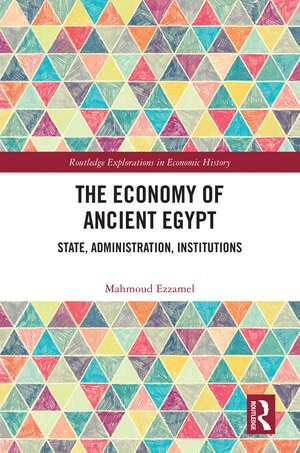The Economy of Ancient Egypt: State, Administration, Institutions: Routledge Explorations in Economic History
Autor Mahmoud Ezzamelen Limba Engleză Hardback – 21 aug 2024
The book examines the classification schemes of the Egyptian population devised by the administrative field of power and how they were used to differentiate, hierarchise and fix specific individuals within clearly demarcated social and economic categories that aimed to fix the subjectivity of those assigned to each category. Ancient Egyptian had a significant state economic sector and a private sector. A multiplicity of sources of state economic resources are examined: taxation/ impost, war booty and tributes, and gifts exchanged between the Egyptian kings and foreign kings. A nuanced understanding of Polanyi’s work on redistribution is used to theorise the cycle of levying, collecting, storing and redistributing tax revenues. Exchanges of gifts between Egyptian kings and kings from Asia Minor are theorised as occurring on a stage of institutional drama, war booty as an ‘economy of force’ and tribute as an economy of restitution. Private exchange is theorised by developing the concept of ‘sociable markets’ and drawing on Maat in its various meanings as truth, fairness and connective justice.
This book will be of interest to readers in the fields of economic history, ancient Egypt and ancient history more broadly.
Din seria Routledge Explorations in Economic History
- 9%
 Preț: 934.31 lei
Preț: 934.31 lei -
 Preț: 169.81 lei
Preț: 169.81 lei -
 Preț: 309.99 lei
Preț: 309.99 lei -
 Preț: 389.40 lei
Preț: 389.40 lei -
 Preț: 309.12 lei
Preț: 309.12 lei -
 Preț: 326.97 lei
Preț: 326.97 lei -
 Preț: 379.05 lei
Preț: 379.05 lei -
 Preț: 312.65 lei
Preț: 312.65 lei -
 Preț: 310.84 lei
Preț: 310.84 lei -
 Preț: 325.09 lei
Preț: 325.09 lei - 8%
 Preț: 390.79 lei
Preț: 390.79 lei -
 Preț: 422.00 lei
Preț: 422.00 lei - 18%
 Preț: 1113.95 lei
Preț: 1113.95 lei - 28%
 Preț: 824.17 lei
Preț: 824.17 lei - 18%
 Preț: 1061.06 lei
Preț: 1061.06 lei - 24%
 Preț: 304.74 lei
Preț: 304.74 lei - 18%
 Preț: 1056.95 lei
Preț: 1056.95 lei -
 Preț: 419.50 lei
Preț: 419.50 lei - 29%
 Preț: 1193.01 lei
Preț: 1193.01 lei - 18%
 Preț: 1055.21 lei
Preț: 1055.21 lei - 18%
 Preț: 1175.51 lei
Preț: 1175.51 lei - 28%
 Preț: 766.65 lei
Preț: 766.65 lei - 18%
 Preț: 1433.54 lei
Preț: 1433.54 lei - 18%
 Preț: 1163.63 lei
Preț: 1163.63 lei -
 Preț: 484.47 lei
Preț: 484.47 lei - 25%
 Preț: 997.11 lei
Preț: 997.11 lei - 18%
 Preț: 1385.39 lei
Preț: 1385.39 lei - 25%
 Preț: 855.59 lei
Preț: 855.59 lei - 18%
 Preț: 1077.57 lei
Preț: 1077.57 lei - 18%
 Preț: 1166.80 lei
Preț: 1166.80 lei - 18%
 Preț: 1126.82 lei
Preț: 1126.82 lei - 28%
 Preț: 851.46 lei
Preț: 851.46 lei - 18%
 Preț: 1175.01 lei
Preț: 1175.01 lei - 42%
 Preț: 195.71 lei
Preț: 195.71 lei - 18%
 Preț: 1055.51 lei
Preț: 1055.51 lei - 18%
 Preț: 1057.05 lei
Preț: 1057.05 lei - 18%
 Preț: 1334.10 lei
Preț: 1334.10 lei - 43%
 Preț: 216.41 lei
Preț: 216.41 lei - 28%
 Preț: 822.54 lei
Preț: 822.54 lei - 18%
 Preț: 1168.09 lei
Preț: 1168.09 lei - 28%
 Preț: 1482.69 lei
Preț: 1482.69 lei - 18%
 Preț: 1164.92 lei
Preț: 1164.92 lei -
 Preț: 485.99 lei
Preț: 485.99 lei - 18%
 Preț: 1065.06 lei
Preț: 1065.06 lei - 18%
 Preț: 1058.79 lei
Preț: 1058.79 lei - 18%
 Preț: 1064.70 lei
Preț: 1064.70 lei - 28%
 Preț: 821.53 lei
Preț: 821.53 lei
Preț: 1120.11 lei
Preț vechi: 1365.99 lei
-18% Nou
Puncte Express: 1680
Preț estimativ în valută:
214.33€ • 233.55$ • 180.61£
214.33€ • 233.55$ • 180.61£
Carte tipărită la comandă
Livrare economică 23 aprilie-07 mai
Preluare comenzi: 021 569.72.76
Specificații
ISBN-13: 9781032550879
ISBN-10: 1032550872
Pagini: 422
Ilustrații: 26
Dimensiuni: 156 x 234 mm
Greutate: 0.77 kg
Ediția:1
Editura: Taylor & Francis
Colecția Routledge
Seria Routledge Explorations in Economic History
Locul publicării:Oxford, United Kingdom
ISBN-10: 1032550872
Pagini: 422
Ilustrații: 26
Dimensiuni: 156 x 234 mm
Greutate: 0.77 kg
Ediția:1
Editura: Taylor & Francis
Colecția Routledge
Seria Routledge Explorations in Economic History
Locul publicării:Oxford, United Kingdom
Public țintă
PostgraduateCuprins
Introduction PART I : THE EMERGENCE OF THE EGYPTIAN STATE AND ADMINISTRATIVE INSTITUTIONS 1. Concepts of the state and ancient Egypt 2. The administrative field of power 3. The administrative field, symbolic power and social connectivity PART II: THE INTERNAL ECONOMY OF EGYPT 4. The Egyptian economy: The debate 5. Economic resources of the state: Taxation 6. Labour, the state and Redistribution PART III: THE STATE ECONOMY: EXTERNAL RESOURCES 7. International trade 8. International relations and the economy of the gift 9. The economy of war booty and tribute PART IV: THE PRIVATE EGYPTIAN ECONOMY 10. Barter, money and private trade 11. Private exchange in close-knit community and sociability 12. Private exchange in Deir el-Medina and sociable markets
Notă biografică
Mahmoud Ezzamel is Distinguished Research Professor at IE University, Madrid, Spain. He is the author of many books, including Accounting and Order (Routledge, 2012) and has published extensively in leading organisation and management studies journals. His interdisciplinary work on accounting, management and economic history draws on insights from social theory and anthropology. He is the recipient of the 2009 Hourglass Award from the Academy of Accounting Historians.
Descriere
Taking ancient records as the starting point for analysis, this book theorises the state, administration and economy of ancient Egypt. The Egyptian state is theorised as an administrative field of material and symbolic powers with emphasis upon the latter because it has received scant attention in Egyptology.
